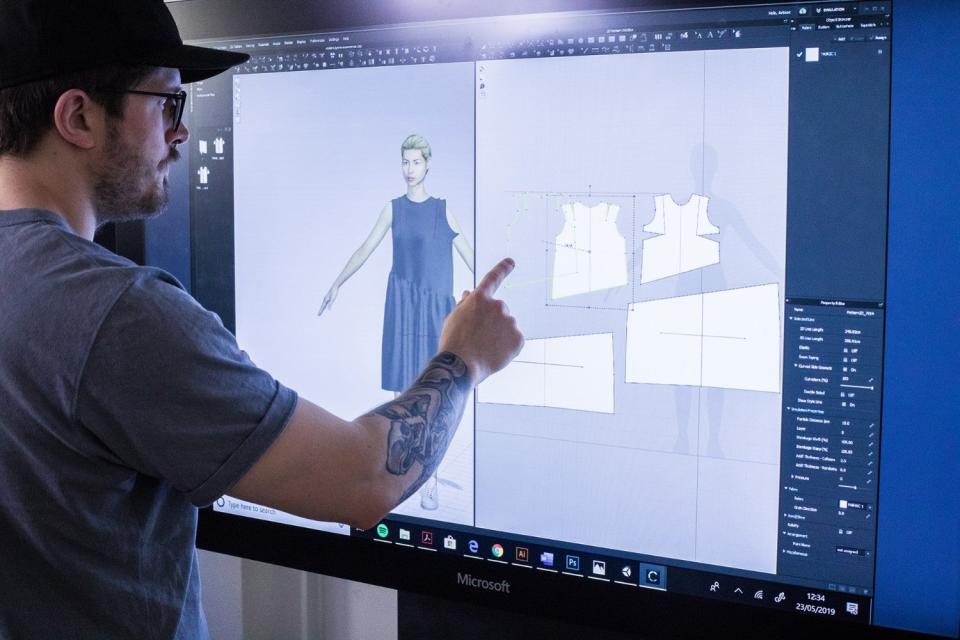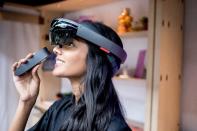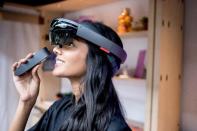The future of fashion? These London students think it's going to be powered by AI and mixed reality
If you were wandering around east London’s Spitalfields market last week you might have found yourself appearing in a brand campaign for yoga leggings or transported to a forest to find the perfect cedar wood scent for a new perfume.
This is because students from the London College of Fashion (LCF) were showing off the future fashion concepts they had created as part of a programme powered by Microsoft’s tech.
First announced last year, the Future of Fashion Incubator gives students from the college three months to create and design a concept that infuses tech with fashion.
The response last year was overwhelming, says Matthew Drinkwater, head of Fashion Innovation Agency at LCF, with lots of interest from luxury and high street brands in the concepts the students were working on. “When we first started the project, on a simple basis we knew we could use technology to affect change in the industry, we knew we could make a difference,” he explains.
“When we sat down afterwards, we said let’s streamline and see how we can focus on a few ideas and see if there is a business model we can start to accelerate and push forward.”
The new name for this year’s project was “Accelerating the Future of Fashion”. The students were tasked with coming up with ideas that would have a real business impact. One concept takes the idea of “deep fakes”, videos that use AI to alter what a person is doing or saying, and turns it on its head by embedding people’s faces onto a model’s body, as a way to turn anyone into a micro-influencer and expand a brand’s reach.

Three of the projects use Microsoft’s mixed reality headset and tech, HoloLens, whilst another uses AI to decrease waste in the pattern cutting stage.
Speaking about the impact of HoloLens, Drinkwater believes the tech has “enormous potential” for the industry. “The device is going to show how the industry will be utterly transformed by adding digital content into the physical world.
“That ‘oh wow’ moment, when you try it, that emotional reaction? Fashion is about an emotional reaction and that’s what this tech is enabling.”
One project will be taken forward to receive extra support from Microsoft, including the chance to spend some time with the company’s US-based research and development team.
“All of the projects have legs in their own in the way they can impact the retail environment, brand storytelling, delivering customer experiences, or in the manufacturing and design spaces,” says Maruschka Loubser, director of brand partnerships and campaigns at Microsoft. “What I love is that this is the future of the industry and the students are driving change across all different businesses.”
The LCF X Microsoft Future of Fashion concepts
Art-Z
Fabric waste during the pattern-cutting stage is an issue, and Art-Z hopes to solve this using AI and machine learning via Microsoft’s Azure cloud computing. The AI analyses a pattern and suggests ways to create a less-wasteful pattern.
Created by Ashwini Suhas Deshpande
Brick & Pixel
Brick & Pixel wants to save the high-street by combining Microsoft Kinect and smart mirrors to bring products to life and improve the brand experience for customers.
Created by Abdul Haseeb Azizi, Julia Karolina Frey, and Noelia Fernández Galiana
E.M.I
E.M.I wants to bring the customer into the design process through the creation of a mixed reality design tool, using Microsoft HoloLens, to create a bespoke garment.
Created by Andrew Le Casse

Rixlea
This project uses Microsoft HoloLens and wearable sensor technology in clothes to help athletes with injury recovery.
Created by Leah Hoy and Rielle Park
Swapp
A spin on deep fake technology, Swapp uses AI to swap out a model’s face on brand content and replace it with a customer’s to create organic marketing for brands.
Created by Helen Wang and Joanna Lanceley
Perfume Experiential Discovery
Using smart sensor technology and the HoloLens headset, this project allows customers to experience a perfume’s scent and immersive themselves in a mixed-reality environment to create a dynamic shopping moment.
Created by Costas Kazantzis and Eirini Batakis








